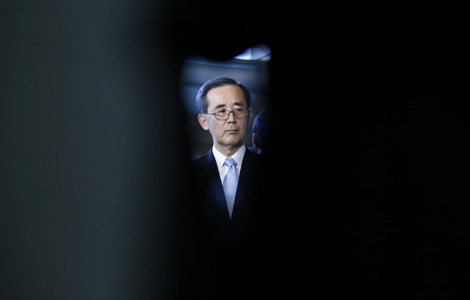
|
 |
|
Bank of Japan Governor Masaaki Shirakawa is seen between reporters while he speaks at a joint news conference with Finance Minister Taro Aso and Economics Minister Akira Amari after their briefing with Prime Minister Shinzo Abe (not pictured) in Tokyo January 22, 2013. [Photo/Agencies]
|
TOKYO - Japanese Prime Minister Shinzo Abe said Tuesday that a joint statement between the Bank of Japan (BOJ) and the Japanese government on setting two percent inflation target is significant for bold monetary easing policy.
Abe made the remark after the BOJ and the government released the written statement on fighting the country's prolonged deflation and he urged the BOJ to achieve the goal at an early date.
The BOJ decided the day to set a two percent inflation goal and pledged to ease monetary conditions "decisively" at the conclusion of a two-day policy meeting.
The decision was in line with Abe's call, so as to stimulate Japan's stagnant economy.
In the statement, the government vowed to take growth strategies and restore fiscal health.
To combat prolonged deflation and achieve sustainable economic growth with price stability, the government and BOJ will enhance policy coordination, according to the statement.
Meanwhile, the bank introduced an open-ended easing steps similar to those of the US Federal Reserve, such as buying government bonds and other relatively safe financial assets from financial institutions without setting a deadline.
The central bank also increased Japan's gross domestic product (GDP) outlook for fiscal 2013 to 2.3 percent from 1.6 percent and maintained the rate that banks are charged for overnight loans at 0 to 0.1 percent.
The statement said that Japan's economy is still weak and the factors that would affect Japan's economic outlook are European debt crisis, recovery of U.S. economy, sustainable economic growth in emerging economies and the relations between China and Japan.
Japan's economy has contracted for a second straight quarter in the three months through September, shrinking an annualized real 3. 5 percent. Analysts say the economy has entered a mild recession amid sluggish demand both at home and abroad.
Abe, who took office on Dec 26, has put pressure on the BOJ to carry out bold monetary easing plans until two percent inflation is achieved.